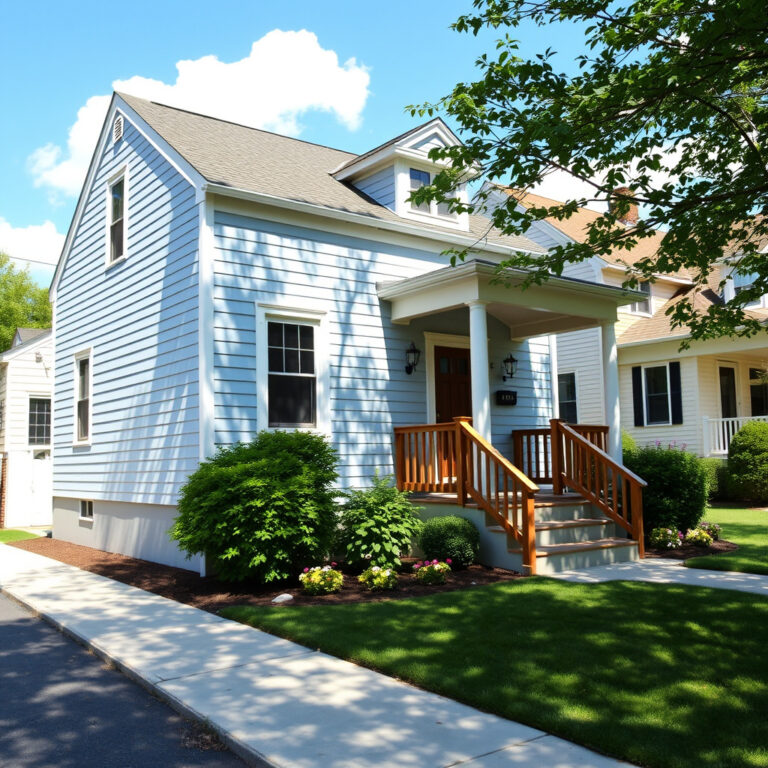Home renovation permits are official approvals required to ensure that construction and renovation projects meet local building codes and safety regulations.
Home renovation permits are crucial for anyone considering a home improvement project.
In this post, we will explore why these permits are necessary and how they can impact your renovation plans.
You’ll learn about the different types of permits, the application process, and how to avoid costly mistakes.

The Importance of Home Renovation Permits
When embarking on a home renovation project, one of the most crucial steps is obtaining the right permits. Home renovation permits are not just bureaucratic hurdles; they serve vital purposes that can significantly affect the outcome of your project. Understanding the importance of these permits can save you time, money, and stress in the long run.
Ensuring Safety and Compliance
One of the primary reasons for requiring home improvement permits is to ensure that all renovations comply with local building codes and safety regulations. These codes are designed to protect the health and safety of residents and the integrity of the structure. For instance, if you are planning to change your kitchen layout, it is essential to work within the guidelines to prevent issues like electrical hazards or plumbing failures.
Increasing Property Value
Obtaining the proper residential renovation permits can also enhance the value of your home. Potential buyers often feel more secure knowing that all improvements were made legally and according to code. This can be particularly important when considering major renovations like kitchen remodels or bathroom upgrades. A well-documented renovation can be a selling point, demonstrating that the work was done thoughtfully and professionally.
Avoiding Legal Issues
Skipping the permit process may seem like an easy way to save time, but it can lead to significant problems down the line. Municipalities often have the authority to impose fines or even require you to reverse unpermitted work. In some cases, homeowners may be required to disclose any unpermitted renovations when selling their property, which can complicate the sale process. Thus, ensuring you have the correct building permits for home renovation can safeguard you from these legal challenges.
Understanding Permit Requirements
Before you dive into your project, it’s essential to familiarize yourself with permit requirements for home improvement in your area. This may vary significantly depending on the scope of your project. For example, kitchen renovation permits often involve specific inspections for plumbing and electrical work, while bathroom renovation costs may include fees for permits that ensure compliance with water usage regulations. Knowing what to expect can help streamline the process.
Planning for the Future
When you secure the necessary permits, you are not just addressing immediate project needs; you are also planning for future renovations. Many homeowners find that having a clear record of permitted work makes it easier to undertake additional projects later on. Whether you are considering deck construction permits for an outdoor space or painting permits for home improvement, understanding the permitting process can provide a solid foundation for future endeavors.
Finding Help and Resources
If navigating the permitting process seems daunting, don’t hesitate to seek help. Local building departments often provide resources to guide you through the requirements. Additionally, working with professionals, such as deck builders near me or contractors experienced in obtaining home remodeling permits, can ease the burden and ensure that your project adheres to all regulations.
By recognizing the significance of home renovation permits, you set the stage for a successful, compliant, and stress-free renovation experience. Whether you are dreaming about kitchen design ideas or contemplating bathroom design ideas, taking the time to understand and secure the right permits is a critical step in transforming your home into the space you envision.
Navigating the Permit Application Process
Obtaining the right home renovation permits is a crucial step in any renovation project. This process can often feel overwhelming, but with the right approach and understanding, it can be navigated smoothly. When you decide to embark on a home improvement project, whether it’s a new kitchen or a deck, knowing the necessary permit requirements for home improvement is essential.
Understanding Permit Types
First, familiarize yourself with the different types of permits you may need. For instance, kitchen renovation permits are specific to any major changes in your kitchen layout, plumbing, or electrical work. Similarly, if you’re building an outdoor space, you’ll need deck construction permits to ensure your project meets local codes. Take the time to research the specific requirements in your area, as they can vary significantly.
- Building Permits for Home Renovation: Required for structural changes.
- Kitchen Renovation Permits: Necessary for plumbing and electrical modifications.
- Bathroom Renovation Permits: Needed when altering plumbing or layouts.
- Deck Construction Permits: Essential for adding outdoor structures.
- Painting Permits for Home: Sometimes required for exterior projects.
Gathering Necessary Documentation
Once you know what permits you need, it’s time to gather the required documentation. This may include site plans, architectural drawings, and proof of ownership. If you’re unsure what’s necessary, local building departments often provide checklists that can guide you. Proper documentation not only smooths the application process but also helps avoid any potential delays.
Filing the Application
When you’re ready to file your application, ensure that all forms are filled out completely and accurately. Missing information can lead to rejection, causing delays in your renovation timeline. Be prepared for potential fees associated with the application process, which can vary based on the type of permit and the scope of your project.
Inspections and Approvals
After submitting your application, you may need to schedule inspections at various stages of your renovation. These inspections ensure that all work complies with local regulations and safety standards. It’s essential to maintain open communication with inspectors and be ready to provide access to your home when required.
Staying Informed
Throughout the permit process, stay informed about any changes in local regulations that could impact your project. This is particularly important in the context of residential renovation permits, as rules can evolve. Being proactive and engaged will help you manage your project effectively and ensure that everything runs smoothly.
Remember, while the process may seem daunting at first, taking it step by step can make it manageable. With careful planning and attention to detail, obtaining your home renovation permits can lead to a successful and satisfying home improvement experience.
Common Types of Home Renovation Permits
When it comes to enhancing your living space, understanding the various types of home renovation permits is essential. These permits not only ensure that your project complies with local regulations but also help maintain safety and quality standards. Here’s an overview of the most common permits you might encounter in your renovation journey.
Building Permits
Building permits are a fundamental requirement for most significant renovations. Whether you’re adding an extension or making structural changes, this permit ensures that your project adheres to building codes. The application process typically involves submitting detailed plans and specifications, which will be reviewed by local authorities.
Electrical and Plumbing Permits
If your renovation includes any electrical work or plumbing alterations, you will need specific permits for these systems. These permits are crucial as they help ensure that all work is done safely and meets the necessary codes. For instance, if you’re planning to install new lighting fixtures as part of your kitchen design ideas or updating your bathroom with modern plumbing, obtaining these permits is a must.
Kitchen and Bathroom Renovation Permits
For projects focused on updating your kitchen or bathroom, specific kitchen renovation permits and bathroom renovation permits may be required. These permits often cover changes to fixtures, cabinets, and appliances. Given that kitchens and bathrooms have unique plumbing and electrical needs, ensuring compliance with local regulations is critical.
Deck Construction Permits
If you’re planning to build a deck, you will likely need a deck construction permit. This type of permit ensures that the deck is safely constructed and meets local codes regarding height, materials, and design. Consulting with local deck builders near me can help streamline this process, as they are often well-versed in the necessary permits.
Painting Permits
While many homeowners might not think about permits when it comes to painting, certain exterior projects may require painting permits for home. This is especially true for homes in historic districts or areas with specific aesthetic regulations. If your renovation involves a significant change in color or materials, checking for permit requirements is wise.
Permit Requirements for Home Improvement
Understanding the permit requirements for home improvement projects can save you time and ensure compliance. Generally, minor renovations may not require permits, but it’s always best to check with your local building department. Whether you’re considering a simple update or an extensive remodel, being informed about what permits are needed will facilitate a smoother renovation process.
By grasping the different types of home renovation permits and their importance, you can embark on your remodeling journey with confidence. Make sure to consult local regulations and guidelines to ensure that your project is not only beautiful but also compliant and safe.
Understanding Local Building Codes and Regulations
When embarking on a home renovation project, one of the most crucial steps is understanding local building codes and regulations. These codes are designed to ensure safety, quality, and compliance throughout the construction process. While they may seem daunting at first, grasping the essentials can lead to a smoother renovation experience.
The Role of Building Codes
Building codes set the minimum standards for construction and renovation, covering everything from structural integrity to energy efficiency. Each municipality has specific codes that reflect local needs and safety concerns. These codes address issues such as:
- Structural requirements to ensure stability
- Electrical and plumbing standards to promote safety
- Energy efficiency guidelines to support sustainability
Understanding these codes helps homeowners avoid potential hazards and ensures that their renovations comply with local laws.
Researching Local Regulations
Every locality has its own set of rules, making it essential to conduct thorough research. You can start by visiting your local building department’s website or office. They typically provide a wealth of information regarding:
- Specific home renovation permits required for various projects
- Application procedures for obtaining these permits
- Inspection requirements and timelines
Engaging with local officials can also clarify any questions you may have about your renovation plans.
Permit Requirements for Home Improvement
When planning your renovation, familiarize yourself with the types of home renovation permits you may need. Depending on the scope of your project, the following permits might be required:
- Kitchen renovation permits for major updates
- Bathroom renovation permits for significant changes
- Deck construction permits if you’re adding outdoor spaces
- Exterior home painting permits, particularly in historic districts
Each of these permits comes with its own set of requirements, so understanding what’s needed upfront can save time and resources.
Staying Compliant During Renovation
Once you have your permits, it’s vital to adhere to the regulations throughout the renovation process. This includes scheduling inspections at various stages of construction. Inspections help ensure that the work meets safety and quality standards, protecting both your investment and your peace of mind.
Working with experienced contractors who are familiar with local building codes can also facilitate compliance. They can provide valuable insights and help navigate any complexities you may encounter.
In the present climate of home improvement, awareness of local building codes and regulations can empower homeowners to make informed decisions. Whether you’re considering kitchen design ideas or contemplating bathroom design ideas, being knowledgeable about the necessary permits and regulations is vital for a successful and compliant renovation project. By taking the time to understand these elements, you’ll be better equipped to bring your vision to life while ensuring safety and quality.
What to Expect During the Permit Review Process
When you embark on a home renovation project, understanding the permit review process can significantly ease your journey. This process is crucial for ensuring that your plans align with local regulations and safety standards, allowing your renovation to proceed smoothly.
The Initial Review
Once you submit your application for home renovation permits, the first step is an initial review. During this phase, the local permitting office checks your submission for completeness. This includes ensuring all required documents are attached, such as architectural drawings, site plans, and any necessary supporting information. If anything is missing, you will receive feedback outlining what needs to be corrected. Being thorough in your initial application can help prevent delays.
Detailed Evaluation
After the initial review, your application will undergo a detailed evaluation. This stage involves various departments, such as zoning, building, and possibly health and safety. Each department will analyze your project to ensure compliance with local building codes and regulations. For example, if you’re planning to implement innovative kitchen design ideas, the kitchen renovation permits will specifically address layout, safety, and plumbing requirements.
Public Notifications and Feedback
In some cases, especially for larger projects, public notifications may be required. This means that neighbors and other stakeholders will be informed about your renovation plans, allowing them to voice any concerns or feedback. This aspect of the process is vital for maintaining community standards and can sometimes lead to modifications in your plans based on constructive input.
Final Decisions and Permit Issuance
Once all evaluations are completed, you will receive a final decision. If your application is approved, you will be issued the necessary building permits for home renovation. It’s important to review these documents carefully, ensuring you understand the stipulations attached. If your application is denied, you will receive feedback explaining the reasons for the decision, enabling you to address these issues in a revised submission.
Staying Informed Throughout the Process
Throughout the permit review process, it’s beneficial to maintain open communication with your local permitting office. They can provide insights and updates on your application status. Additionally, if you’re working with contractors or deck builders near me, ensure they are familiar with the requirements and can assist in navigating this process.
Being proactive and informed will help streamline your renovation experience. Understanding each step of the permit review process ensures that your project aligns with local regulations, paving the way for a successful home improvement journey. Whether you’re considering bathroom design ideas or planning for exterior home painting, staying engaged and aware will ultimately lead to a smoother renovation experience.
Consequences of Skipping Renovation Permits
When embarking on a home renovation project, the excitement of transforming your space can sometimes overshadow the importance of adhering to local regulations, particularly regarding home renovation permits. Neglecting to secure the necessary permits can lead to a series of unintended consequences that can affect not only your project but also your property value and safety.
Legal Repercussions
One of the most immediate risks of skipping renovation permits is the potential for legal issues. Local authorities have strict regulations in place to ensure that all construction work is performed safely and up to code. If you proceed without the required permits, you may face fines, penalties, or even orders to halt work until the proper documentation is obtained. This can lead to project delays, increasing costs, and considerable stress.
Increased Costs
While it may seem like a time-saver to bypass the permit process, doing so can actually result in higher costs in the long run. If your renovation is discovered to be non-compliant, you may be required to dismantle completed work or make expensive modifications to meet standards. Additionally, the costs associated with obtaining permits after the fact can also escalate, especially if you need to enlist the help of professionals to rectify any issues.
Impact on Property Value
Another significant consequence of skipping home improvement permits is the potential impact on your property’s value. When it comes time to sell your home, potential buyers will often request documentation of any renovations made. If you cannot provide proof of permits, you may find it difficult to justify your asking price. This lack of transparency can deter buyers or lead to lower offers, ultimately affecting your return on investment.
Safety Risks
Beyond legal and financial implications, there are serious safety risks associated with unpermitted renovations. Building codes and regulations are designed to protect homeowners and occupants from hazards. Skipping permits can lead to unsafe construction practices, which could compromise the structural integrity of your home. This is particularly concerning in areas like kitchen renovation, where electrical and plumbing work must be done correctly to prevent hazards.
Insurance Complications
Homeowners insurance policies often include clauses that require adherence to local building codes. If an incident occurs—such as a fire or water damage—resulting from unpermitted work, your insurance company may deny your claim. This could leave you with significant out-of-pocket expenses for repairs or damages. Ensuring that you have the proper building permits for home renovation protects not only your investment but also your peace of mind.
Future Renovations and Projects
Finally, failing to obtain the proper permits can complicate future renovation projects. If your home has a history of unpermitted work, you may face additional scrutiny from local authorities when applying for permits for future renovations. This can lead to a frustrating cycle of compliance issues and lengthy approval processes.
In summary, while it may be tempting to skip the often tedious process of obtaining residential renovation permits, the consequences can be far-reaching. From legal troubles and financial burdens to safety concerns and insurance complications, the risks far outweigh any perceived benefits. For a successful renovation journey, understanding and adhering to permit requirements is essential.
Tips for Working with Contractors on Permits
When embarking on a home renovation project, collaborating with contractors can make or break your experience, especially when it comes to handling home renovation permits. Understanding how to effectively work with them can streamline the process and ensure that everything is in line with local regulations. Here are some essential tips to enhance your partnership with contractors while navigating the sometimes complex world of permits.
Establish Clear Communication
From the outset, it’s crucial to maintain open lines of communication with your contractor. Discuss your vision in detail, including any specific kitchen design ideas or bathroom design ideas you have in mind. This will help the contractor understand your expectations, which is vital when applying for the necessary permits. Regular check-ins can also keep both parties aligned on any changes or updates regarding the permit requirements for home improvement.
Understand the Permit Process Together
Before diving into the renovation, take the time to learn about the permit process alongside your contractor. This can include discussing what types of residential renovation permits are applicable to your project, such as kitchen renovation permits for a remodel, or deck construction permits for outdoor spaces. Knowing what’s needed can help prevent delays and ensure that your project runs smoothly.
Document Everything
Documentation is your best friend when working with contractors. Keep a record of all communications, contract details, and permit applications. This not only helps you stay organized but also provides a clear reference point if any issues arise. Make sure that all aspects of the project, including costs like bathroom renovation costs, are documented to avoid any misunderstandings later on.
Verify Contractor Credentials
Before you start working with a contractor, ensure they have the necessary qualifications to handle permits. Check for any required licenses and insurance. This step can save you a lot of headaches and potential setbacks in your renovation journey. A knowledgeable contractor will be familiar with local building codes and regulations, making the permit process more efficient.
Collaborate on Permit Applications
Involve your contractor in the permit application process. Their expertise will be invaluable in ensuring that all forms are filled out correctly and thoroughly. They can also help gather the necessary documentation, such as construction plans and compliance statements. This collaboration can help facilitate a smoother permit approval process.
Stay Informed About Local Regulations
Local building codes can vary significantly, so it’s important to stay informed. Work with your contractor to understand any specific regulations that may apply to your project. This includes knowing about any painting permits for home or other requirements that might affect your timeline or budget. Being proactive about these regulations can help you avoid any unpleasant surprises down the line.
Be Prepared for Changes
During the renovation process, unforeseen issues may arise that require adjustments to your plans or permits. Stay flexible and maintain a positive relationship with your contractor. Open communication will ensure that any necessary changes are handled efficiently, keeping your project on track.
By following these tips, you can foster a productive relationship with your contractor while effectively navigating the complexities of building permits for home renovation. This partnership is key to transforming your vision into reality and creating the home you’ve always dreamed of.
Innovative Tools for Managing Home Renovation Projects
Managing a home renovation project can feel overwhelming, especially when it involves navigating the intricacies of home renovation permits. Today, homeowners are fortunate to have access to an array of innovative tools designed to simplify this process and streamline communication with contractors and local authorities.
Project Management Apps
One of the most effective ways to keep your renovation on track is through project management apps. These digital platforms allow homeowners to create timelines, set budgets, and assign tasks. Some popular options include Trello, Asana, and CoConstruct. With these tools, you can easily monitor progress, ensuring that everyone involved is on the same page regarding permit requirements for home improvement.
Virtual Reality and Augmented Reality
Incorporating kitchen design ideas and bathroom design ideas has never been easier thanks to virtual and augmented reality technologies. These tools allow homeowners to visualize their renovations before committing to significant changes. By simulating different layouts and designs, you can make informed decisions that align with your vision while ensuring compliance with local building codes.
Budgeting Tools
Understanding bathroom renovation costs and other financial aspects is crucial for any renovation project. Budgeting tools like Mint or EveryDollar can help you track expenses, including those related to home renovation permits. By keeping a close eye on your budget, you can avoid surprises and ensure that funds are allocated effectively across different aspects of the project.
Collaboration Platforms
Effective communication with contractors and designers is vital for successful renovations. Tools such as Slack or Microsoft Teams facilitate real-time discussions, file sharing, and updates. This ensures that everyone is informed about changes, including those involving building permits for home renovation. Clear communication can prevent misunderstandings and keep the project moving smoothly.
3D Modeling Software
For those who want to visualize their project in detail, 3D modeling software can be a game-changer. Programs like SketchUp or Home Designer Suite allow homeowners to create detailed designs of their spaces, from exterior home design to interior layouts. This visualization helps clarify ideas and ensures that all designs comply with local regulations and necessary permits.
Online Permit Resources
Many municipalities now offer online resources to help homeowners understand and apply for home remodeling permits. Websites often provide comprehensive guides, checklists, and even online application forms. By utilizing these resources, you can learn about the specific requirements for your area, making it easier to navigate the permit application process.
Real-Time Tracking Tools
Finally, real-time tracking tools enable homeowners to monitor the status of their renovation permits. Some local government websites allow you to check the progress of your applications, ensuring you stay informed throughout the process. This transparency can alleviate stress and help you plan your renovation timeline more effectively.
By leveraging these innovative tools, homeowners can enhance their renovation experience, ensuring that every step, from design to permit acquisition, is managed efficiently. As you embark on your next project, consider how these resources can help you navigate the complexities of home renovations with confidence.
Future Trends in Home Renovation Permitting
As homeowners increasingly prioritize personalization and sustainability, the landscape of home renovation permitting is evolving. In the present scenario, one of the most significant trends is the integration of technology into the permitting process. Local governments are adopting digital platforms that streamline the application for home renovation permits, allowing homeowners and contractors to submit requests online. This innovation not only speeds up the approval process but also enhances transparency, making it easier for applicants to track their permit status.
Emphasis on Sustainability
Sustainability is another vital theme shaping the future of home renovation permits. Many municipalities are encouraging eco-friendly practices through incentives for projects that utilize green materials or energy-efficient designs. Homeowners looking to undertake renovations, such as bathroom renovation costs or exterior home painting, may find that adhering to sustainable guidelines can simplify the permitting process. By aligning their projects with local sustainability goals, they can benefit from quicker approvals and sometimes even financial incentives.
Enhanced Community Engagement
In recent times, community engagement has become a focal point. Local governments are increasingly seeking input from residents regarding zoning changes and renovation regulations. This trend reflects a broader desire for inclusive decision-making, allowing homeowners to voice their opinions on residential renovation permits. As communities become more involved, homeowners can expect a more collaborative approach to the permitting process, ensuring that projects align with neighborhood aesthetics and values.
Streamlined Regulations
The push for streamlined regulations is also gaining momentum. Many jurisdictions are recognizing the need to simplify the complex web of permit requirements for home improvement. By consolidating various permits into a single application or offering clear guidelines for building permits for home renovation, local governments aim to reduce the bureaucratic burden on homeowners. This simplification is particularly beneficial for large-scale projects, such as those involving deck construction permits or significant remodels.
Focus on Technology and Innovation
As technology continues to advance, expect to see more innovative tools for managing renovation projects. Mobile applications and software designed for project management can assist homeowners in tracking timelines, budgets, and permit statuses. For instance, homeowners searching for deck builders near me or exploring kitchen design ideas can find resources that help ensure compliance with local regulations while facilitating smoother communication with contractors.
Increased Awareness and Education
Finally, there is a growing emphasis on education regarding the importance of renovation permits. Homeowners are becoming more informed about the implications of skipping the permitting process, understanding that it can lead to complications down the line. Workshops and online resources are being developed to educate potential renovators about home remodeling permits and the specific requirements for their projects, such as bathroom design ideas or exterior home design.
In this ever-evolving landscape, staying informed and proactive will be key for homeowners navigating the complexities of home renovation permitting. As trends shift and regulations adapt, understanding these changes can empower homeowners to make informed decisions that align with their renovation goals.

Sky Team – Home Renovation Experts. The Sky Team specializes in siding repair, painting, deck renovation, kitchen, and bathroom remodeling. We deliver quality craftsmanship and lasting solutions to enhance your home’s value and beauty.



